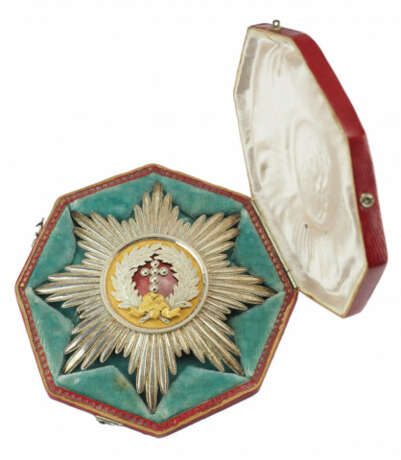Dänemark: Elefanten-Orden, Bruststern, im Etui - Großherzogs Carl Ludwig Friedrich von Baden
25.03.2017 11:00UTC +01:00
Classic
Sold
12000EUR € 12 000
| Auctioneer | Bene Merenti Auktionen |
|---|---|
| Event location | Germany, Ludwigburg |
| Buyer Premium | 25.0 % |
Archive
The auction is completed. No bids can be placed anymore.

ID 357
Lot 124 | Dänemark: Elefanten-Orden, Bruststern, im Etui - Großherzogs Carl Ludwig Friedrich von Baden
Silber, das Medaillon in Gold, Silber und Emaille, feinst ziseliert und mattiert, der Medaillongrund flingiert, rückseitig vergoldet, an Nadel, zwei Seitenhaken im roten Struktur Lederetui, golden aufgeprägte Zierkante, dazu ebenfalls in goldenen Lettern bezeichnet ELEPHANTEN STERN, die Innenkante ebenfalls mit Goldprägung, türkisfarbenes Inlay mit Aussparung für den Stern, der Himmel in weiß gehalten mit zwei seitlichen Verschlusshaken, auf dem grünen Boden Papieretikett mit Ordensbezeichnung. Anbei Auszug aus dem Register der Ritter des Elephanten-Orden von 1846.
VPI1 S. 201, BURKE S. 301ff 97 x 96 mm, 62,7 g.
Carl Ludwig Friedrich von Baden wurde am 8. Juni 1786 in Karlsruhe geboren. Nachdem sein Vater im Jahre 1801 auf der Rückreise von Russland bei Arboga in Schweden tödlich verunglückte, war er von seinem Großvater dem Großherzog Carl Friedrich 1808 in gewisser Art zum Mitregenten angenommen. Seine Karriere im Militär machte ihn u.a. zum General der russischen Infanterie sowie Inhaber des klein-reußischen Grenadier-Regiments. Nach dem Tode seines Großvaters übernahm er am 10. Juni 1811 die Regierungsgeschäfte - am 9. September desselben Jahres wurde er dann mit dem Elefanten-Orden dekoriert. Er selbst stiftete am 26. Dezember 1812 den Orden vom Zähringer Löwen. Er verstirbt am 8. Dezember 1818 in Rastatt.
Zustand: I
| Address of auction |
Bene Merenti Auktionen Stuttgarter Straße 50 71638 Ludwigburg Germany | ||||||||||||||
|---|---|---|---|---|---|---|---|---|---|---|---|---|---|---|---|
| Preview |
| ||||||||||||||
| Phone | +49 (0)7141 972 6840 | ||||||||||||||
| Fax | +49 (0)7141 972 3226 | ||||||||||||||
| Buyer Premium | 25.0 % | ||||||||||||||
| Conditions of purchase | Conditions of purchase | ||||||||||||||
| Business hours | Business hours
|


